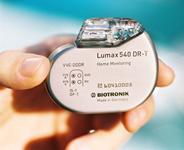
July 20, 2010 – The final results of the landmark TRUST Trial (Lumax-T/Lumos-T Safely RedUceS RouTine Office Device Follow-up), which show wireless remote monitoring of implantable cardiac devices offers earlier detection of potenial cardiac problems, were published in the July 27 issue of Circulation.
The article, “Efficacy and Safety of Automatic Remote Monitoring for ICD (implantable cardioverter defibrillator) Follow-Up: The TRUST Trial,” demonstrates significant benefits of the Biotronik Home Monitoring system in the safe reduction of conventional clinic follow-up visits, as well as in the early detection of patient clinical events, including asymptomatic atrial fibrillation. Further, Home Monitoring can extend the time between routine in-office follow-ups, and is the only system having FDA and CE approval to claim these benefits.
Developed by a steering committee of U.S. electrophysiologists, with 1,450 patients enrolled and randomized in 102 North American sites, TRUST is the first large-scale prospective cardiac rhythm management study to prove remote monitoring and rapid detection of symptomatic and asymptomatic cardiac events in a prospective, randomized trial. TRUST used Biotronik Home Monitoring, an automatic, wireless system that performs daily telemetric surveillance of the patient and reports the technical status of the implanted device without requiring patient activation.
“Automatic remote monitoring is an exciting new technology that holds many promises. TRUST is the first large study to test it in patients with ICDs. The TRUST results unequivocally establish remote monitoring as a highly effective method of follow up,” said Niraj Varma, M.D., cardiac pacing and electrophysiology, department of cardiovascular medicine, Cleveland Clinic and TRUST national principal investigator. “Patients’ safety is enhanced by enabling prompt medical care if problems occur in either their clinical condition or in their devices. At the same time, the need for regular in-clinic follow-up is virtually halved. I believe, from these results, that remote monitoring will improve the way physicians care for patients with all forms of implantable electronic cardiac devices.”
Biotronik Home Monitoring provides daily updates of patients’ cardiovascular conditions and the status of their implanted devices. When clinically significant events occur, such as critical abnormalities in the heart’s rhythm, or when changes occur in device status, Home Monitoring automatically sends an alert message to a secure Internet-based system. The physician then is immediately able to read a high-definition intracardiac electrocardiogram and other decision-critical information through the Home Monitoring system.
Home Monitoring allows patients to be monitored continuously and wirelessly by their physician, from anywhere in the world with any computer and an Internet connection. Unlike other systems that require cardiac device patients to activate remote monitoring, sometimes using complicated technology, Home Monitoring is fully automatic, wireless and mobile, and requires no patient intervention.
“Decreasing the number of non-actionable, scheduled and unscheduled office visits through remote monitoring significantly eases the pressure of overloaded follow-up cardiac clinics. This permits physicians to focus on patients who actually require intervention,” stated Charles Love, professor of medicine and director of cardiac rhythm device services, The Ohio State University and TRUST principal investigator.
For more information: www.biotronik.com


 January 05, 2026
January 05, 2026 









